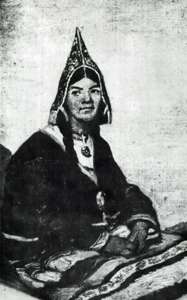Christiana Morris
Christiana Morris (1804–1886) was a Mi'kmaq crafts person, known for her skill at porcupine quillwork, as well as her respected position in 19th century Halifax, Nova Scotia.[1]
Christiana Morris | |
|---|---|
 | |
| Born | Mali Christianne Paul Mollise ca. 1804 Nova Scotia, Canada |
| Died | ca. 1886 Nova Scotia, Canada |
| Nationality | Canadian |
| Known for | Quillwork |
| Spouse(s) | Tom Mollise |
Biography
Christiana Morris was the anglicized name for Mali Christianne Paul Mollise.[2] She was born ca. 1804 in the Stewiacke area of Nova Scotia.[2] At a young age Morris wed Tom Mollise, a man much older than she, who died shortly after the marriage.[1] Although she never remarried, she did adopt a son, Joe, and took in an orphaned niece.[1][2]
Morris was known to two Commissioners of Indian Affairs; Joseph Howe and Col. William Chearnley.[2] Morris was granted a piece of land in Halifax after presenting Queen Victoria with a pair of quillwork moccasins.[1]
Morris exhibited in Nova Scotia Provincial Exhibitions in 1845, 1854, and 1868. She won several prizes for her work, including, in 1854, First Prize for best full-sized birch bark canoe.[1][2]
Around Halifax, Morris donned traditional native garb, including a pointed cap. Her outfits provided a showcase for her crafts work. Additionally, she was sought after as a model.[2]
Morris died in Nova Scotia, the probable date of her death is 1886.[2]
References
- "Morris, Christiana". Canadian Women Artists History Initiative. Retrieved 26 November 2017.
- Whitehead, Ruth Holmes (1 January 1977). "Christina Morris: Micmac Artist and Artist's Model". Material Culture Review / Revue de la culture matérielle. 3. ISSN 1927-9264. Retrieved 26 November 2017.